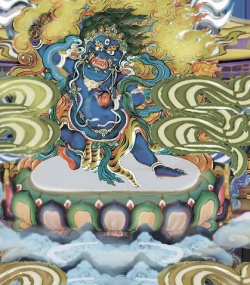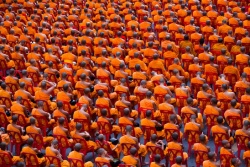Difference between revisions of "Through the Bathing of Buddha to Attain Purification of our Spirit -- Tzu Chi Northwest Region held Buddha Bathing ceremony"
(Created page with " Two thousand and five hundred years ago, on the eighth day of the fourth lunar month, ;;Siddhartha Gautama'', a former Indian {{Wiki|prince}}, attained...") |
|||
| Line 1: | Line 1: | ||
| + | <nomobile>{{DisplayImages|3935|1786|2349|4062}}</nomobile> | ||
| − | |||
| − | |||
| − | + | Two thousand and five hundred years ago, on the [[eighth day]] of the ''[[fourth lunar month]], ;;[[Siddhartha Gautama]]'', a former [[Indian]] {{Wiki|prince}}, [[attained]] [[enlightenment]] under the evening {{Wiki|stars}} and founded [[Buddhism]]. | |
| − | + | Upon the [[attainment]] of [[enlightenment]], [[Buddha]] aspired to {{Wiki|purify}} [[human]] [[minds]] through [[Dharma]], the [[teachings of Buddha]]. | |
| − | Besides the [[Dharma]] brothers and sisters from the Branch, many citizens from the local {{Wiki|community}} attended the {{Wiki|ceremony}}. The publicity group prepared mini [[prayer]] cards for all attendees to write down their wishes to post on the board. The [[staff]] meeting, coincidentally held the next day, also allowed the [[Dharma]] | + | In [[remembrance]] of [[Buddha]] and his [[birthday]], [[Buddhists]] and their organizations around the [[world]] celebrate the [[Buddha’s]] [[birthday]] every May through the [[ritual]] of bathing the [[Buddha]]. |
| + | |||
| + | |||
| + | The [[Buddha]] Bathing [[ritual]] represents the individual’s [[spiritual]] growth and the ability to attain the [[spirit]] of [[Buddha]]. | ||
| + | |||
| + | In the {{Wiki|ceremony}}, [[Buddhists]] shower the [[Buddha]] statue with fragrant [[water]], perfumed by many aromatic herbs such as agalwood (aloes [[wood]]), [[white sandalwood]], sweet pine, Cnidium officinale (a {{Wiki|medicinal}} herb), and Curcuma Longa (a fragrant herb). | ||
| + | |||
| + | |||
| + | This is a reenactment of the [[heavenly]] [[dragons]] showering the [[Buddha’s body]] with fragrant [[rain]] upon [[Buddha’s birth]]. | ||
| + | |||
| + | Not only is the [[ritual]] one of the most important [[Buddhist ceremonies]], it is also a {{Wiki|social}} and {{Wiki|cultural}} event that prompts one’s [[spiritual]] [[development]]. | ||
| + | |||
| + | |||
| + | Bathing the [[Buddha]] is not just about remembering the [[enlightened one]] – [[Buddha]], but also [[symbolizes]] the [[purification]] of our [[minds]]. | ||
| + | |||
| + | By bathing the [[Buddha]], we [[accumulate]] the [[merits]] to help all [[sentient beings]] within the [[six realms]] to be free from [[suffering]] and to guide them to cultivate a [[spiritual path]]. | ||
| + | |||
| + | |||
| + | Perhaps someone will question why [[Buddha]] needs us to bath Him? | ||
| + | |||
| + | Truly, bathing [[Buddha]] is about cleansing our [[minds]], [[awakening]] our [[Buddha]] within, and eventually [[attaining]] the purest [[Dharma body]], [[Dharmakaya]]. | ||
| + | |||
| + | |||
| + | |||
| + | In today’s [[world]], we pursue [[fame]] and [[wealth]] relentlessly. We may be rich in the {{Wiki|materialistic}} [[sense]] but our [[spirituality]] is poor due to increasing [[stress]] and [[frustration]]. | ||
| + | |||
| + | Bathing the [[Buddha]] helps us to [[contemplate]] [[Buddha’s teachings]] and to cleanse our troubled [[minds]]. It reminds us to always to have a [[pure]] [[heart]]. | ||
| + | |||
| + | Similar to taking a bath that cleans the [[physical body]], bathing the [[Buddha]] helps to remove our [[afflictions]] and {{Wiki|purify}} our [[minds]]. | ||
| + | |||
| + | If we can remind ourselves to [[contemplate]] and reflect in [[Buddha’s teaching]] in our everyday [[lives]], [[purification]] of our [[minds]] is an attainable goal. | ||
| + | |||
| + | |||
| + | [[Tzu Chi]] [[Northwest]] Regin held the [[Buddha Bathing ceremony]] at its center on [[Saturday]], May 8th this year. | ||
| + | |||
| + | During the day, it was open to the public at 10am, 2pm, and 4pm. | ||
| + | |||
| + | In addition to remembering and celebrating the [[Buddha’s]] [[birthday]], the Branch wished that through the [[Buddha]] Bathing {{Wiki|ceremony}}, every attendee would be able to {{Wiki|purify}} his/her [[mind]], remove all [[afflictions]], and realize his/her intrinsic [[Buddha nature]]. | ||
| + | |||
| + | Moreover, [[seeing]] the [[endless]] natural and man-made {{Wiki|disasters}} today, bathing [[Buddha]] faithfully {{Wiki|signifies}} both the elimination of an individual’s obstructive [[karma]] and a [[prayer]] for [[world]] [[peace]]. | ||
| + | |||
| + | |||
| + | Besides the [[Dharma]] brothers and sisters from the Branch, many citizens from the local {{Wiki|community}} attended the {{Wiki|ceremony}}. | ||
| + | |||
| + | The publicity group prepared mini [[prayer]] cards for all attendees to write down their wishes to post on the board. | ||
| + | |||
| + | The [[staff]] meeting, coincidentally held the next day, also allowed the [[Dharma brothers]] and sisters at the other branches the opportunity to attend the [[Buddha]] Bath {{Wiki|ceremony}}. | ||
| + | |||
| + | Furthermore, the [[teachers]] at the children’s classes guided their students at the [[Buddha Bath ceremony]] and [[taught]] stories about [[Buddha’s birth]] in the afternoon. | ||
| + | {{R}} | ||
| + | http://northerncal.us.tzuchi.org/nc.nsf/Report/k10747 | ||
| + | [[Category:Ritual purification]] | ||
Revision as of 00:20, 21 November 2015
Two thousand and five hundred years ago, on the eighth day of the fourth lunar month, ;;Siddhartha Gautama, a former Indian prince, attained enlightenment under the evening stars and founded Buddhism.
Upon the attainment of enlightenment, Buddha aspired to purify human minds through Dharma, the teachings of Buddha.
In remembrance of Buddha and his birthday, Buddhists and their organizations around the world celebrate the Buddha’s birthday every May through the ritual of bathing the Buddha.
The Buddha Bathing ritual represents the individual’s spiritual growth and the ability to attain the spirit of Buddha.
In the ceremony, Buddhists shower the Buddha statue with fragrant water, perfumed by many aromatic herbs such as agalwood (aloes wood), white sandalwood, sweet pine, Cnidium officinale (a medicinal herb), and Curcuma Longa (a fragrant herb).
This is a reenactment of the heavenly dragons showering the Buddha’s body with fragrant rain upon Buddha’s birth.
Not only is the ritual one of the most important Buddhist ceremonies, it is also a social and cultural event that prompts one’s spiritual development.
Bathing the Buddha is not just about remembering the enlightened one – Buddha, but also symbolizes the purification of our minds.
By bathing the Buddha, we accumulate the merits to help all sentient beings within the six realms to be free from suffering and to guide them to cultivate a spiritual path.
Perhaps someone will question why Buddha needs us to bath Him?
Truly, bathing Buddha is about cleansing our minds, awakening our Buddha within, and eventually attaining the purest Dharma body, Dharmakaya.
In today’s world, we pursue fame and wealth relentlessly. We may be rich in the materialistic sense but our spirituality is poor due to increasing stress and frustration.
Bathing the Buddha helps us to contemplate Buddha’s teachings and to cleanse our troubled minds. It reminds us to always to have a pure heart.
Similar to taking a bath that cleans the physical body, bathing the Buddha helps to remove our afflictions and purify our minds.
If we can remind ourselves to contemplate and reflect in Buddha’s teaching in our everyday lives, purification of our minds is an attainable goal.
Tzu Chi Northwest Regin held the Buddha Bathing ceremony at its center on Saturday, May 8th this year.
During the day, it was open to the public at 10am, 2pm, and 4pm.
In addition to remembering and celebrating the Buddha’s birthday, the Branch wished that through the Buddha Bathing ceremony, every attendee would be able to purify his/her mind, remove all afflictions, and realize his/her intrinsic Buddha nature.
Moreover, seeing the endless natural and man-made disasters today, bathing Buddha faithfully signifies both the elimination of an individual’s obstructive karma and a prayer for world peace.
Besides the Dharma brothers and sisters from the Branch, many citizens from the local community attended the ceremony.
The publicity group prepared mini prayer cards for all attendees to write down their wishes to post on the board.
The staff meeting, coincidentally held the next day, also allowed the Dharma brothers and sisters at the other branches the opportunity to attend the Buddha Bath ceremony.
Furthermore, the teachers at the children’s classes guided their students at the Buddha Bath ceremony and taught stories about Buddha’s birth in the afternoon.



